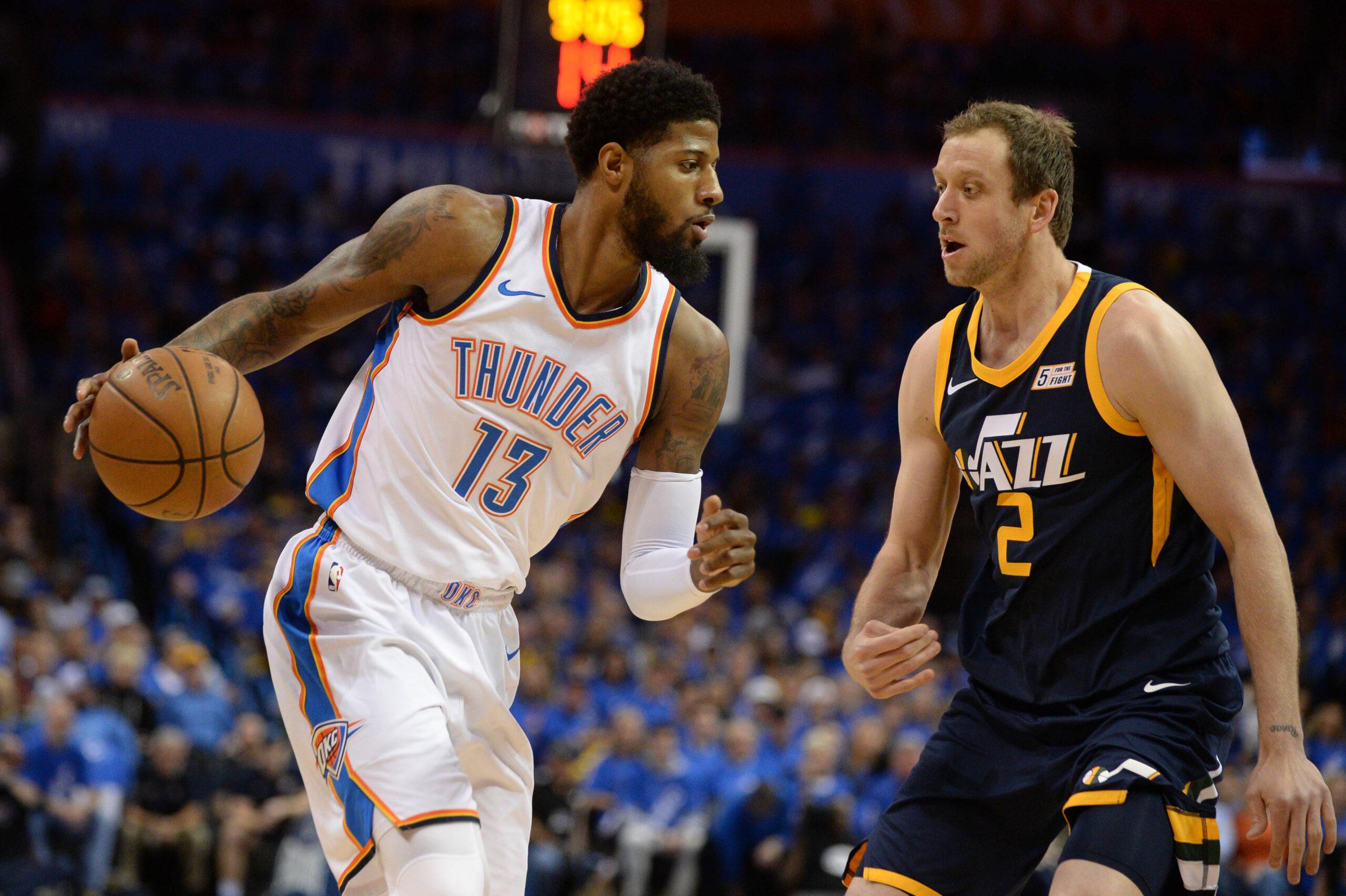
After stumbling into homecourt advantage on the last day of the regular season, the Thunder took care of the Jazz, 116-108, in Game 1 of their first-round series thanks to an offensive explosion from Paul George. Here are the three takeaways:
Playoff P Is Real
Playoff P
play·off p | pla-ˌof pe’ | nounA self-given nickname used to describe the forward for the Oklahoma City Thunder when he dominates on both ends of a playoff game. Playoff P has a limitless ceiling.
Example: In Game 1, Playoff P was on fire.
Indeed, George scored 20 points in the first half against the Jazz and finished with 36 points, including a postseason career-high and franchise-high-tying eight made 3s. In George’s bag of tricks were buzzer beaters:
And ankle-breakers:
No single player on one of the best defenses in the league could contain George, let alone stop him. On defense, George made Donovan Mitchell and Joe Ingles uncomfortable, and he even guarded Rudy Gobert on a couple switches. It was a two-way clinic, and a boon for the Thunder given that George looked shaky at the end of the regular season. This performance had shades of Indiana Paul George, and was more like what OKC expected when it traded for him in the offseason.
“Y’all ain’t met Playoff P yet, huh?” George asked rhetorically in a press conference on Saturday. Should the Jazz allow him to reintroduce himself like this throughout the series, their postseason might not last very long.
Utah Needs a Second Playmaker
Utah ripped off a 16-4 run to start the game. It was less than ideal for OKC, but maybe it was also a wake-up call. The Thunder defense responded by putting a padlock on Quin Snyder’s unit the rest of the half, which threw them out of sync the rest of the game. Their plan seemed to be bother Mitchell, freeze out Joe Ingles, and let Ricky Rubio and Jae Crowder take relatively open shots every time down the floor. It worked.
Rubio took a whopping 18 shots in the game and only finished with 13 points. Ingles’s impact was stifled, as he could barely put up 13 points on nine shots. Utah shot 4-from-14 from 3 in the first half and finished 11-for-28. Steven Adams’s aggressive play down low also sent Gobert to the bench for foul trouble at one point in the third quarter. Mitchell got hot in the second half and kept the Jazz in it, finishing with a team-high 27 points. But even his hero-ball efforts weren’t enough.
This feels like a problem for the Jazz going forward in the series, especially considering that OKC’s top-end talent is far more seasoned than Mitchell. It’s striking how much Utah already relies on the rookie to be their offensive motor—the team struggled to generate offense when he was off the court on Sunday—but playing through him on most offensive possessions doesn’t feel like a long-lasting recipe either. Mitchell looked exhausted by the third quarter, and even suffered a left-foot injury that required an in-game X-ray; he’s expected to have an MRI for what is being described as “foot soreness.” By the time he returned to the bench, the hole the Jazz were in was too big to climb out of.
What to Do About Melo
Playoff Melo, unlike Playoff P, barely lasted one quarter. Alongside Raymond Felton, Terrance Ferguson, Jerami Grant, and Alex Abrines—a unit that had played a whopping five minutes together all season—Melo appeared to have found a workable niche after a rough regular season. He scored nine quick points and looked to be on his way to a Good Melo game, which is a rarity these days.
But Anthony would go on to score only six more points the rest of the game, finishing 5-for-13 from the field and 2-for-7 from 3. He was largely inconsequential, and sometimes—like when he decided to head into an isolation or post-up—an aside in the middle of stretches where the Thunder offense looked fluid. To OKC’s benefit, a handful of role players picked up the slack: Abrines, Grant, and Felton combined for only 17 points, but gave the Thunder valuable minutes off the bench (they were a combined plus-35).
The Thunder Big 3 had 43 of the team’s 54 points at the half. By the end, both Westbrook and George had racked up a combined 65 points (Westbrook finished with 29 points, 13 rebounds, and eight assists) while Melo ended up with 15. Melo’s inconsistency had little effect on the final result, but his mercurial play, combined with the amount of shots he sucks up, could come back to bite them in this series.
